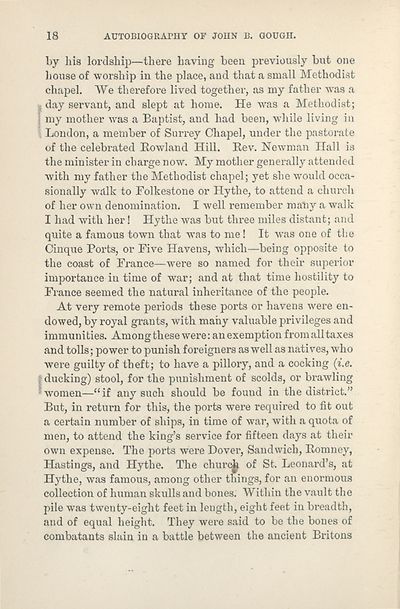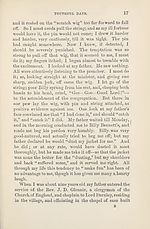Download files
Complete book:
Individual page:
Thumbnail gallery: Grid view | List view

18 AUTOBIOGRAPHY OF JOHN B. GOUGH.
by his lordship—there having been previously but one
house of worship in the place, and that a small Methodist
chapel. We therefore lived together, as my father was a
l day servant, and slept at home. He was a Methodist;
| my mother was a Baptist, and had been, while living in
I London, a member of Surrey Chapel, under the pastorate
of the celebrated Howland Hill. Rev. Newman Hall is
the minister in charge now. My mother generally attended
with my father the Methodist chapel; yet she would occa¬
sionally walk to Folkestone or Hythe, to attend a church
of her own denomination. I well remember many a walk
I had with her! Hythe was but three miles distant; and
quite a famous town that was to me! It was one of the
Cinque Ports, or Five Havens, which—being opposite to
the coast of France—were so named for their superior
importance in time of war; and at that time hostility to
France seemed the natural inheritance of the people.
At very remote periods these ports or havens were en¬
dowed, by royal grants, with many valuable privileges and
immunities. Among these were: an exemption from all taxes
and tolls; power to punish foreigners as well as natives, who
were guilty of theft; to have a pillory, and a cocking (i.e.
I ducking) stool, for the punishment of scolds, or brawling
* women—“ if any such should be found in the district.”
But, in return for this, the ports were required to fit out
a certain number of ships, in time of war, with a quota of
men, to attend the king’s service for fifteen days at their
own expense. The ports were Dover, Sandwich, Romney,
Hastings, and Hythe. The churci of St. Leonard’s, at
Hythe, was famous, among other things, for an enormous
collection of human skulls and bones. Within the vault the
pile was twenty-eight feet in length, eight feet in breadth,
and of equal height. They were said to be the bones of
combatants slain in a battle between the ancient Britons
by his lordship—there having been previously but one
house of worship in the place, and that a small Methodist
chapel. We therefore lived together, as my father was a
l day servant, and slept at home. He was a Methodist;
| my mother was a Baptist, and had been, while living in
I London, a member of Surrey Chapel, under the pastorate
of the celebrated Howland Hill. Rev. Newman Hall is
the minister in charge now. My mother generally attended
with my father the Methodist chapel; yet she would occa¬
sionally walk to Folkestone or Hythe, to attend a church
of her own denomination. I well remember many a walk
I had with her! Hythe was but three miles distant; and
quite a famous town that was to me! It was one of the
Cinque Ports, or Five Havens, which—being opposite to
the coast of France—were so named for their superior
importance in time of war; and at that time hostility to
France seemed the natural inheritance of the people.
At very remote periods these ports or havens were en¬
dowed, by royal grants, with many valuable privileges and
immunities. Among these were: an exemption from all taxes
and tolls; power to punish foreigners as well as natives, who
were guilty of theft; to have a pillory, and a cocking (i.e.
I ducking) stool, for the punishment of scolds, or brawling
* women—“ if any such should be found in the district.”
But, in return for this, the ports were required to fit out
a certain number of ships, in time of war, with a quota of
men, to attend the king’s service for fifteen days at their
own expense. The ports were Dover, Sandwich, Romney,
Hastings, and Hythe. The churci of St. Leonard’s, at
Hythe, was famous, among other things, for an enormous
collection of human skulls and bones. Within the vault the
pile was twenty-eight feet in length, eight feet in breadth,
and of equal height. They were said to be the bones of
combatants slain in a battle between the ancient Britons
Set display mode to:
![]() Universal Viewer |
Universal Viewer | ![]() Mirador |
Large image | Transcription
Mirador |
Large image | Transcription
| Antiquarian books of Scotland > Temperance > Autobiography and personal recollections of John B. Gough > (30) |
|---|
| Permanent URL | https://digital.nls.uk/125987729 |
|---|
| Description | Thousands of printed books from the Antiquarian Books of Scotland collection which dates from 1641 to the 1980s. The collection consists of 14,800 books which were published in Scotland or have a Scottish connection, e.g. through the author, printer or owner. Subjects covered include sport, education, diseases, adventure, occupations, Jacobites, politics and religion. Among the 29 languages represented are English, Gaelic, Italian, French, Russian and Swedish. |
|---|

